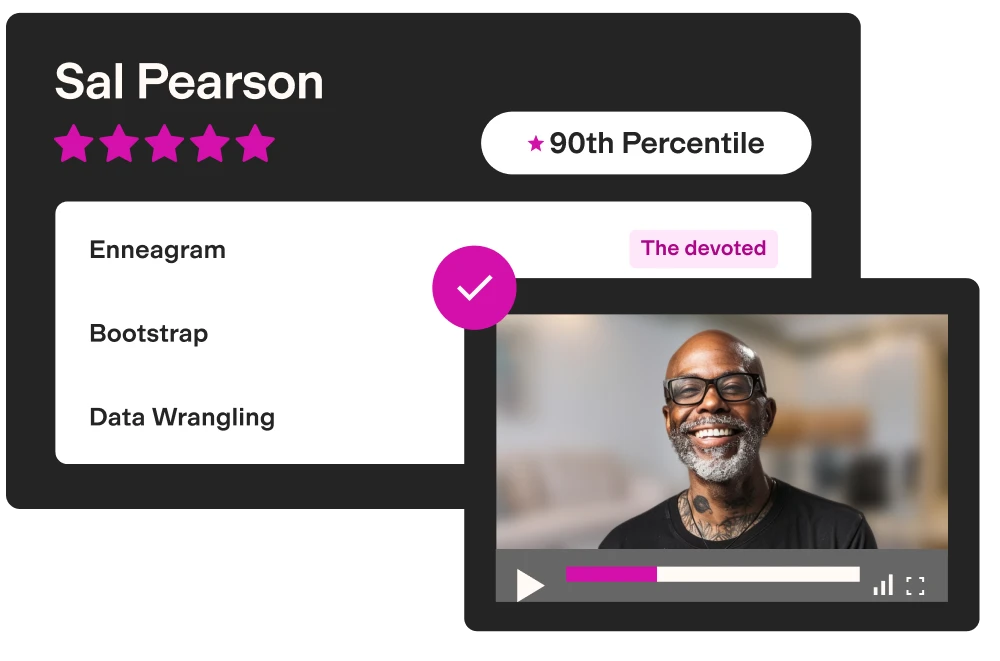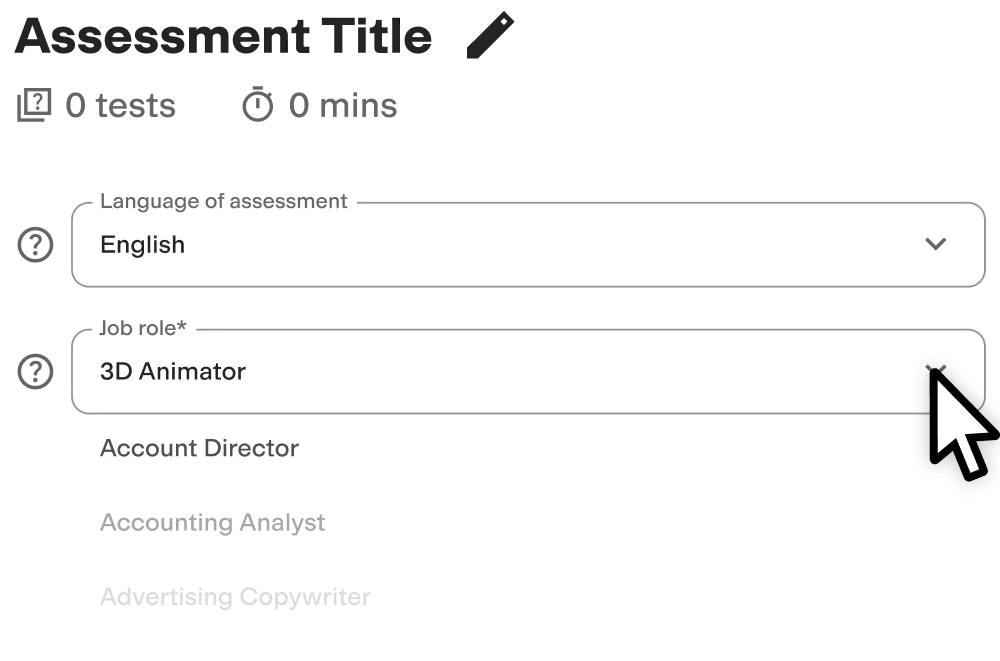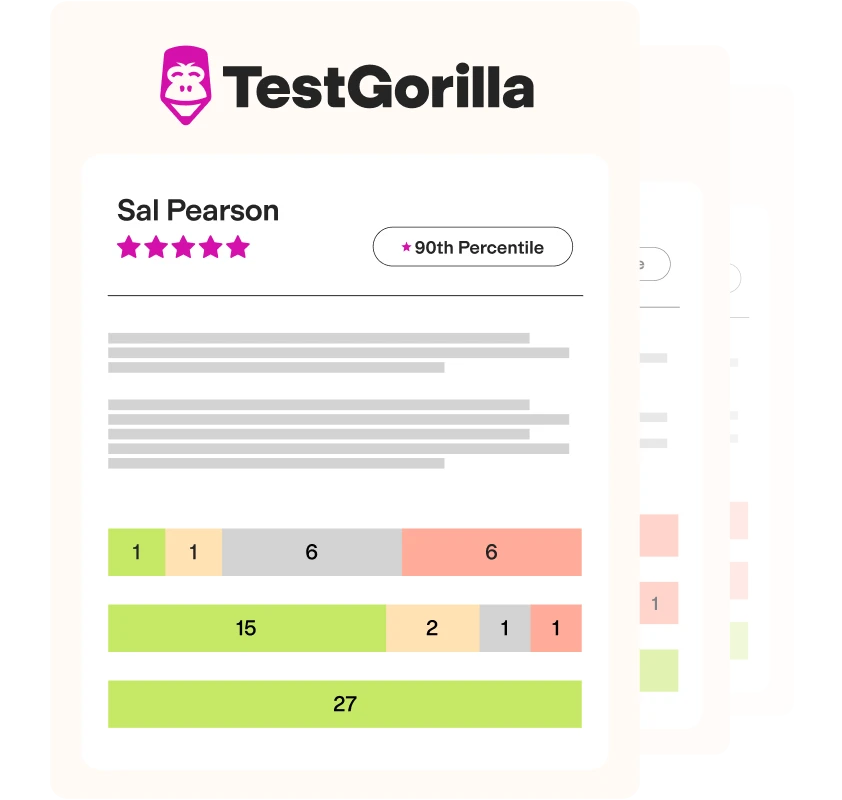QA / Engineer test
Summary of the QA Engineer test
The Quality Assurance, or QA Tester test, evaluates the critical skills required to be an effective software test engineer. It helps you identify candidates who can apply their knowledge of quality assurance in a team setting and confidently manage projects to achieve results.
Covered skills
Applying general testing and QA process knowledge
Communicating effectively in a team setting
Utilizing project management capabilities
Understanding test execution methods and tools
Use the QA Engineer Tester test to hire
Software test engineers, software quality assurance testers, product managers, and security testers.
About the QA Tester test for engineers
Our test helps you find proactive QA engineers and specialists with exceptional quality assurance knowledge and an understanding of how to apply it in complex, high-pressure situations.
A QA tester is responsible for ensuring that software products are fit and ready for launch. Their testing process involves maintaining quality control in product functionality, durability, scalability, and safety before the software platform ever reaches users.
A QA test candidate who passes this exam can confidently:
Performance test software and other products without supervision
Find and log defects and usability issues
Apply problem solving techniques to uncover solutions for identified problems
Assess the user experience through user acceptance testing (UAT)
Supervise and manage the entire testing strategy to ensure that both quality requirements and deadlines are met
Work with product developers to make sure that product changes take place
Communicate with their teams and other stakeholders
Check out our practice preview questions to see this QA test for engineers in action.
The test is made by a subject-matter expert
TestGorilla’s tests are created by subject matter experts. We assess potential subject-matter experts based on their knowledge, ability, and reputation.Before being published, each test is peer-reviewed by another expert, then calibrated using hundreds of test takers with relevant experience in the subject.
Our feedback mechanisms and unique algorithms allow our subject-matter experts to constantly improve their tests.
Erman G.
Earning a bachelor’s degree in business IT & management was the catalyst for Erman’s avid interest in QA. In 2014, he stepped into his first role as a software tester—and never looked back.
Over the next five years, Erman was recognized for his creative and results-driven approach to software testing. His adeptness as a QA engineer opened doors to positions in top companies throughout the Netherlands. Recently, Erman decided to extend his reach in the field by branching out as a freelancer.
Reliability: Cronbach’s alpha coefficient = .64
Face validity: Candidates rated this test as accurately measuring their skills (average score of 3.98 out of 5.00).
Criterion-related validity: Candidates with higher scores on this test received higher average ratings from the hiring team during the selection process (r = .36).
For an in-depth look at interpreting test results, please take a look at our Science series articles: How to interpret test fact sheets (part 1): Reliability, and How to interpret test fact sheets (part 2): Validity.
For an explanation of the various terms, please refer to our Science glossary.
Reliability and validity | Sufficient data available | Analyses and checks conducted | Outcome |
|---|---|---|---|
Reliability | ✔ | ✔ | Acceptable |
Content validity | ✔ | ✔ | Acceptable |
Face validity | ✔ | ✔ | Acceptable |
Construct validity | Pending | Pending | Pending |
Criterion-related validity | ✔ | ✔ | Acceptable |
Group differences | |||
Age differences | Pending | Pending | Pending |
Gender differences | ✔ | ✔ | Acceptable |
Ethnicity differences | Pending | Pending | Pending |
Use TestGorilla to hire the best faster, easier and bias-free
Our screening tests identify the best candidates and make your hiring decisions faster, easier, and bias-free.
Create high-quality assessments, fast
Building assessments is a breeze with TestGorilla. Get started with these simple steps.
Why are QA testing skills important to employers?
Development teams with great QA testers help employers produce consistently high-quality applications, tools, and other end products.
Failure to utilize proper QA methodologies results in unhappy and unsafe customers, extra work to fix problems after launch, and potentially serious reputation damage. Instead, by hiring people with strong QA testing skills, employers can:
Detect problems early and save time on late fixes: QA testing early in development means there’s less reason to scramble for fixes late on in the process
Ensure end users are safe and satisfied: QA testers iron out security issues so users can feel safe installing products and using personal data
Develop products that are scalable over time: QA testing helps software remain open to improvements as they arise in the future
Protect their reputations: QA testers ensure consumers have professional-standard, fully working final products, therefore reducing complaints
Key quality test engineer skills and competencies
QA experts are curious, empathetic, and keen to find and solve problems to help make users’ lives easier. They typically use the following quality assurance engineer skills at work:
Communication: QA testers communicate with stakeholders, work with product developers, lead QA team members, and keep their managers informed
Critical thinking: A quality test engineer looks at different scenarios to get products ready to launch to the public, meaning they need to be focused, agile, and objective about solving problems
Attention to detail: The best testers are highly precise and can use their testing tools to find even the smallest problems and bugs in their software, reducing the need for extra fixes and expenses
Leadership and discipline: QA testers and engineers need to lead others by example – they are in charge of the entire quality assurance workflow and often lead different specialists from various departments of a business
Coding: Coding and computer science skills can help software testers communicate more easily with software engineers and understand programming issues that affect product quality during the software development life cycle
Time management: QA experts test products with tight deadlines and ensure they’re safe to ship by launch day, which requires schedule management under pressure and strong self-motivation
Analytical skills: QA experts must understand their product’s potential strengths and weaknesses inside and out to conclude if it satisfies QA standards
TestGorilla’s talent discovery platform makes it easy to measure these skills. Software development experts like 7Systems GmbH use our platform to better understand candidates’ talents before interviewing. Thanks to skills-based hiring, the company hires top-quality engineering and development professionals faster and more confidently than ever.
What job roles can you hire with our QA skills test?
As a highly specialized skill, QA testers are suited to specific development roles that cover multiple types of testing:
Software test engineers identify and fix technical issues across various aspects of a tool, such as functionality, durability, safety, and speed, to ensure that the quality of the final product matches the company guidelines and expectations
Manual and functional QA testers perform general manual tests and functional tests to find defects and ensure specific user functions work as expected
Automated QA testers rely on complex scripts and write code to look for specific problem areas in a software test, saving time and effort
Software product managers oversee the complete software development process by following software QA testing and its principles
Security testers run security examinations to ensure programs are robust against attacks and hacking, sometimes using ethical hacking and penetration testing
When hiring for these positions, you should use this QA test for engineers plus four other of our QA engineer or QA analyst tests to measure technical job skills, soft skills, personality, and fit. More on this below.
Create a multi-measure assessment: 4 tests to pair with the Quality Assurance Engineer test
Our talent discovery platform helps you build custom, multi-measure assessments of up to five different tests, which evaluate technical skills alongside personality traits and soft skills.
So, next to this QA skills test, consider using the following to gain a holistic picture of your applicants:
Critical Thinking test: Run our Critical Thinking exam to find a practical, conscientious QA tester. Critical thinkers are unbiased, professional problem solvers who thrive under pressure and focus on data. For more analytical roles, run our Numerical Reasoning test alongside it.
Attention to Detail (Textual) test: Review your candidates' abilities to spot minute details in complex data against the clock with textual and visual tests. The best QA testers never leave a bug unfixed or a flaw unreported.
Communication test: Discover confident applicants who listen actively and speak carefully. A great QA tester communicates clearly and concisely with people at all stages of the product development process.
Coding: Entry-Level Algorithms test: Recruit testers with the programming skills you use in-house through our entry-level coding exam. Coding skills help QA testers quickly understand potential challenges during development and spot issues faster.
After you’ve picked and set up your assessment, don’t forget to use our guide to QA questions in the interview stage to determine whether candidates have the skills needed to test and create flawless software.
FAQs
View a sample report
The QA Test Engineer test will be included in a PDF report along with the other tests from your assessment. You can easily download and share this report with colleagues and candidates.







